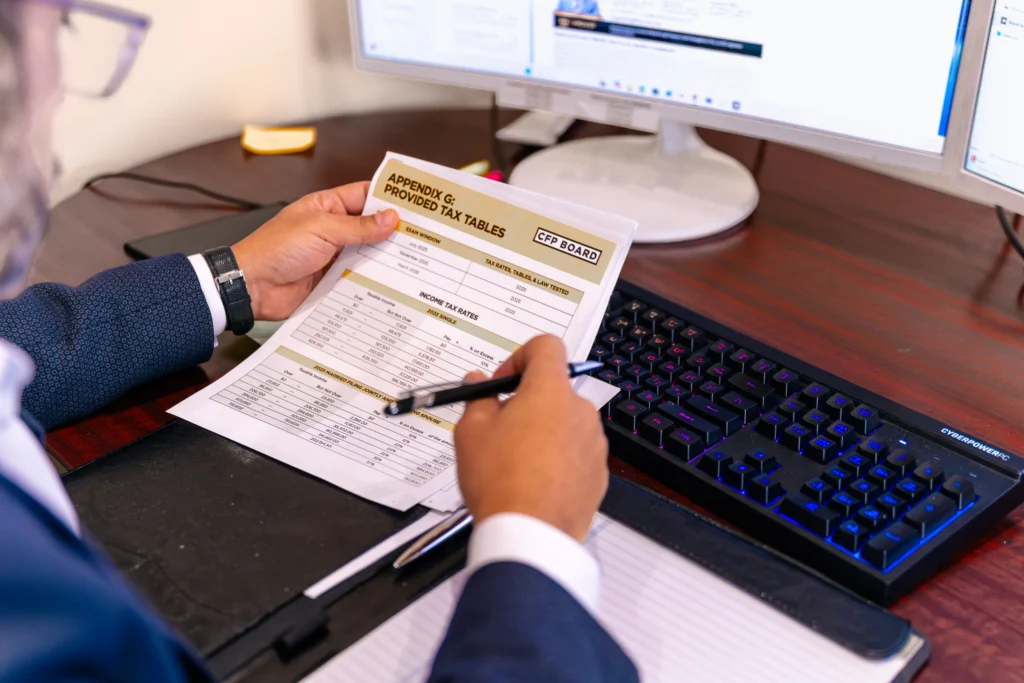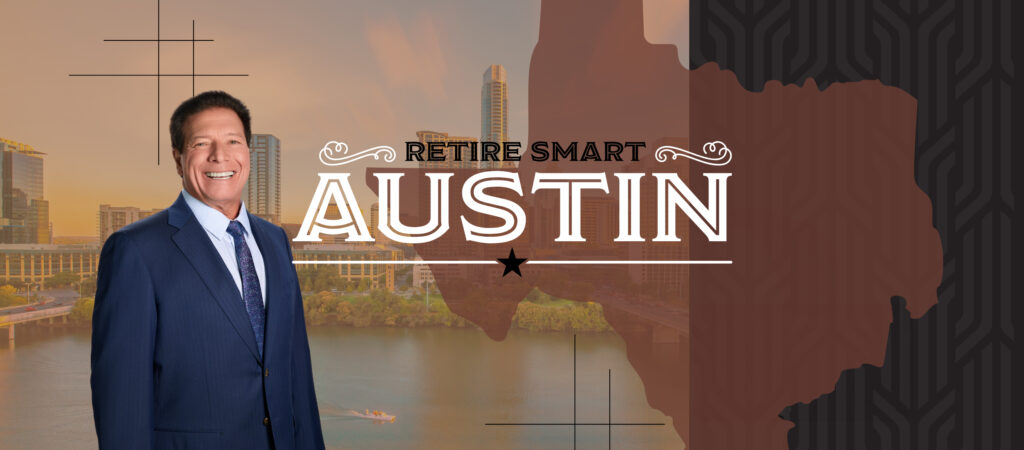Cynthia de Fazio 00:28
Welcome to Retire Smart Austin. My name is Cynthia De Fazio and I’m joined today by Phil Capriatti, senior He is founder and president of Empower Wealth and Tax. Phil, how are you today this morning?
Philip Capriotti 00:39
I’m doing wonderful. Cynthia, how about yourself?
Cynthia de Fazio 00:42
I am doing fantastic. blessed to be in the studio with you. I’m always excited about our time together.
Philip Capriotti 00:46
Happy New Year. Happy 2024.
Cynthia de Fazio 00:49
Thank you. And what a great year we’re having so far. Right? It’s been amazing. Absolutely. Perfect. Well, we have a very interesting topic for today’s show. And this is a good one this is talking about? How do you break up with your financial advisor? So, Phil, why did you choose that?
Philip Capriotti 01:06
Well, and then how do you choose a new one? Yeah. So, you know, it kind of reminded me of the songs 50 ways to leave the lover. Okay. And, you know, many times folks are so used to working with an advisor and they become complacent and I’m referring to not just the individual, but the advisors as well there used to it’s a warm, it’s, it’s comfy, you know that there are several reasons to break up with your advisor. Number one reason is I believe it’s very important to be eye to eye with your advisor, it’s extremely important to meet with them. And, and to actually have candid conversations I’m speaking over the counter. So, when you move from a Florida or from a New York or California or wherever, and you come into town, one of the things that you should do, especially when you’re getting ready to get into retirement, is realize that your current advisor may have gotten you here, they probably were into the accumulation, buy and hold and so forth. But as soon as you get back and get into town, you really want to start interviewing a distribution specialist. So many advisors refuse to take on the tax issue. They refuse to talk about taxes. One of the biggest challenges we’re going to have in retirement, no if ands or buts about it, are increasing taxes. Absolutely. Many advisors also do not structure a written retirement plan. I’m noticing this a lot. We get a lot of appointments, a lot of prospects, and who many of them turn into clients who never really had a Morningstar report done. They haven’t had their portfolios really explain why should I keep this particular investment, and maybe sell this one. So, there’s a communication or lack of communication. So, when you look at for a new advisor, there’s many reasons even if you have a good relationship with your existing advisor, make sure you’re getting your money’s worth. absolutely make sure that your advisor not only as your tax specialist, has made sure that your state plan is in order. And also making sure that your retirement income plan is tax efficient. If your current advisor is not doing all those things, and doing them on a regular basis, at least several times a year, chances are you need to start shopping for another advisor. One other thing if you’re not communicating with your advisor weekly, and when I say weekly, they said what do you mean weekly? Well, we send out a weekly newsletter to our clients. And it amazes me how other advisors just don’t do that. Now, I realize there’s a lot of work involved. Sure. But taxes change just about weekly, geopolitical issues change weekly. And so, we send out to newsletters, and I think all professional advisors should do this to keep their clients up to date. This is what’s going on in the market. These are the changes that we’re recommending in your portfolio. Okay, these are the upcoming tax changes. This is what you’re talking about in Congress. This is how we need to prepare for them. So, if your current advisor lives far away from you, or is not doing all of these, we’ll call them mundane tasks, but I think their actual there, there’s no reason no reason not to be doing it. I don’t believe they’re earning their advisory fee; you can do better. And you can start with calling 888-818-6557. Again, for our first live callers, we’d like this Meet with you look at a Morningstar report and talk to you about how we do things differently. So, breaking up with your advisor is, it’s really not that hard to do. Especially if you’re truly not getting the all the value you should out of your current advisor.
Cynthia de Fazio 05:19
Absolutely. So, I think what I’m hearing you say Phil is, don’t be afraid to make a new plan stand don’t need Don’t be coy. yourself free. I, You said that song we opened and I just couldn’t get out of my head the entire time.
Philip Capriotti 05:33
I love it not only set yourself free, but set your retirement income plan tax free. Okay, so we take a look at that. The first thing you want to do when you’re shopping or looking for a new advisor is Don’t look for just the person who lives maybe down the street, or a big box retailer that has a name brand, you see a lot of commercials, you really want to look at credentials, and then qualifications. So, we’ll talk a little bit about that. I like to ask questions. So, in order for me to know my client, I’m going to ask them a lot of questions. I’m used to asking questions we have, we’ve completed 1000s of retirement income plans, I need to get to know the client first to help understand to help me understand what it is that this client needs my help with all of the specific areas that we need to touch.
Cynthia de Fazio 06:27
Yep. So, a good point, though, I hate to interrupt you. But so often people are nervous or afraid to ask questions when they’re interviewing financial advisors, because a lot of times people feel like, they don’t understand what the adviser is saying. But you have a very simple approach. When you speak to your clients, you actually educate them almost like a teacher to a student. And I’ve heard you say before that there’s no such thing as a silly question, correct?
Philip Capriotti 06:51
It’s very important. Yeah, that’s very, it’s very important. And many advisors are like, don’t worry about it, I you know, they kind of give off the aura. And I’ve seen this, even with advisors that I train. I’m the professional here, just don’t worry about it. We have your back, we have your plan, but not really specific. Very few, few advisors, maybe one out of 10 actually initiate a written retirement income plan. Almost none of the advisors talk about maximizing Social Security and minimizing the taxes on that. I hear very, very few advisors, aside from maybe Ed slot, Ira, Master lead advisors like myself, to how do you retire tax free. So, here’s the bottom line, if you have paid taxes through your entire lifetime, and you want to continue paying taxes throughout your retirement time, then don’t worry about an advisor who doesn’t actually do your tax planning or initiate it. So, you want to make sure that that advisor not only as a certified financial planner, and also a certified analyst, and if not a CFP, and a CFA, how about your home office? Are they licensed fiduciary certified financial planners, certified analyst as well. The next thing I want to look at is experience. And I’m not talking about the old fogy, that’s been in business for 3040 years, that’s not experience, experiences. How many clients do you work with? And how many written retirement income plans? have you executed for them? Is it a dozen? Is it 50? Is it hundreds 1000s. And the reason I say that folks, is because the more plans that you’ve actually your advisors actually worked with, okay, the more answers he’ll have, or she will have. Also, we want to know, and this is my very next question, when it comes to tax planning with my retirement income. Am I going to be working with you? Are you going to tell me to find a CPA to answer my tax questions?
Cynthia de Fazio 09:06
Perfect Point. It really truly is. And Phil, I hate to interrupt you. But we do have to take a very short commercial break. Now you have an offer for the first five callers. Can we talk about what that is before we open the phones?
Philip Capriotti 09:17
Yes. Don’t worry about breaking up with your advisors but come in and get a second opinion. You need to understand what you’re missing to really get the full context of what we’re talking about here. So, what we would like to do is number one, let’s do a portfolio X ray. I’d like to run a Morningstar report created by a certified financial planner, and also portfolio observation recommendations completed by a certified financial analyst. These are folks okay that look at these. They look at these portfolios to give recommendations and come in and make sure that you have a written tax efficient retirement income plan. This is complimentary for the first five callers, please call Your number today is 888-818-6557. And I believe there’s a QR code. And you can snap that if you don’t have the pen handy. Come in and visit with us. As you probably know, we opened up our second office out in the Horseshoe Bay Area absolutely love it. For those of you who are wondering about our expansion, we are in the process of opening up another office in Sun City, Georgetown, that’ll be coming to fruition within the next 12 months. So, give us a call come see us either at Cedar Park, or come out to come out to Horseshoe Bay. We’d love to visit with you, and we’d love to give you that well needed second opinion.
Cynthia de Fazio 10:40
Phil, thank you so much to our viewers at home, that number to call is 888-818-6557. We’re going to take a very short commercial break here on retire smart Austin. But when we come back, we’re going to dive into more questions that you should be asking when you’re interviewing a financial adviser. Or perhaps you need to break up with your current one. How do you know stay tuned, we’ll be right back momentarily.
Philip Capriotti 11:04
I watched my parents work, work themselves really to the bone. I saw my father retire at 63 and pass away. Six months later, once he had stopped working. My mom looked at me and she said, You better be an accountant. You better learn the tax law. I went to a private school, got a great education, lived in the library and graduated without any debt. I realized the benefit of being debt free at a very young age. And I also realized the benefit of educating and speaking to people and I liked working with folks who actually needed help. I started my company 17 years ago, and now we employ two CPAs and two licensed tax professionals. We have a legal arm that helps folks design trusts as well as wills. We have an insurance and that offers property casualty insurance, we sell health insurance, Medicare Supplements, long term care life insurance annuities, and we have wealth management that I started to work with Ed Slott looking at tax efficient ways to have retirees or soon to be retirees retired tax free. If your accountant or CPA is not also your financial advisor, you really have a conflict of interest.
Cynthia de Fazio 12:35
Welcome back to Retire Smart Austin. My name is Cynthia De Fazio joined today by Phil Capriatti, senior He is founder and CEO of Empower Wealth and Tax and we’re talking about top questions to ask when you’re interviewing a financial adviser? Or how do you know that perhaps it’s time to break up with your current advisor? Phil, this is a great topic and a very interesting one because a lot of people don’t know if they’re in the right hands or not.
Philip Capriotti 12:58
Breaking up is very hard to do. There’s no doubt about that. When you’re looking many times, you don’t even know that you need to break up with your advisor. And the reason I say that you don’t know what you’re missing. Okay, when you don’t know what other advisors bring to the table. So, one of the other questions or one of the third questions really has to do with compensation structure. So, I want to ask my advisor straight out, and I asked people to ask us questions I urge them to when they come into the office, how do I charge for my services? What types of services do you offer? What are the fees for each service? Okay, and how long have you been doing this? How long have you been in this office? How long have you been in the industry? So, you want to know if number one are you a fee based planner? Are you commission only? Are you a broker dealer? Are you a licensed fiduciary? So, in our firm, we charge fees we’re fee based planner, but we also receive commission or compensation from insurance products. The reason is we offer so many different insurance products. We have property casualty; we have homeowners we have the Medicare supplements and Medicare Advantage. These are insurance products. So, if you need an insurance product, whatever it happens to be, we’re paid by the insurance company, we see they receive a commission either in a lump sum or over a period of years. But we’re also a fee-based planner. So, we’ll charge a fee to put a plan together if we’re not working with that client. Anytime we’re managing a portfolio folks, we are charging a management fee and that is split several different ways. Our traders receive a part of it our home office gets a part of it. The administrative whether it’s our custodian whether it might be fidelity or Schwab, whoever whatever custodian we’re working with. And then we also get a piece of that as well. So as your portfolio grows, our compensation grows, just through volume, not through additional fees. Okay. We also have a tax practice, we perform tax returns, in addition to tax returns, we structure Roth conversions. In fact, we’re getting ready to have a big party out in Horseshoe Bay Yacht Club, we just cracked across the 150, Mark 150 clients that we’ve brought are actually close to 150 over the 100. I think they told me 120, but that are now retiring tax free. Oh, my goodness, one of our big things. So, we were having this referral party because we get a lot of clients for referrals. So, I was like, Wait a second, that’s not a big enough party. What about all of the clients that are now retiring tax free, they’re not paying taxes on their social security, they’re not paying taxes on their distributions from their IRA. So, at any rate, I’m looking forward to doing that, because that’s truly a, a milestone. So, ask, how many Roth conversions have you done? How many of your clients are retiring tax free? Don’t be afraid to ask the questions. Absolutely. Also, are you a licensed fiduciary. And what that means is, you know, when you hire an attorney, they’re your fiduciary, you’re paying them a fee to protect you either write a contract or what have when you hire a CPA, a fiduciary, they’re hiring to do your taxes are your auditing or whatever it happens to be when you hire a registered investment advisor, not necessarily a broker dealer, although some broker dealers are fiduciary, but when you hire an ri, a registered investment advisor, then registered investment advisor is obligated by law to act in your best interest. They’re not under any obligation to sell a company’s group of products that a company may or may not telling them to offer. To know you’re looking at the whole range of products. Absolutely. How would I build my portfolio? And the way I would build my portfolio the same way I would build my client’s portfolio? So, what is your fiduciary duty to the client?
Cynthia de Fazio 17:14
Very, very important. Phil, what about this next one? Obviously, someone’s investment philosophy? Why is that important to know how that advisor is going to look at their portfolio, if you will.
Philip Capriotti 17:25
So, investment philosophy is extremely important and very rarely talked about? What we’re talking about with investment philosophy is, are you a tactical money manager? Are you an active money manager? Are you a passive investment advisor? So, what does that mean? Now your advisor should say, number one, know what all three are. And number two, say, we do it all. Certain types of accounts need to be actively managed. For instance, after we executed Roth conversions, I want to actively manage that Roth conversion, I want to minimize the volatility in it. But I also want to maximize the return. I also want to make sure that this is a tax free, a philosophy that we’re looking at. Some of them may be day traders, some of them are tactical, they may move in and out of asset classes and sectors based on the economic cycle that we’re in. So, they may make changes in portfolio. Some of them may be paint by number of portfolio managers, okay? Passive, they set it, and they forget it. They ask you a group of questions based on your age and your timeline to retirement, Oh, you’re 6040 you’re 5050 you meaning 50 stock 50 bonds. I call this password they set it and forget it. So different types of accounts, taxable accounts need to be managed different than a Roth IRA than an IRA. So, make sure that your new advisor and actually ask these questions of your current advisor because if your current advisor is not giving you these questions, maybe it’s time to go out shopping for a new advisor,
Cynthia de Fazio 19:13
And it’s also time for us to take our next commercial break. Phil, can you believe it every time we’re on a roll here? I’ll go ahead and lead this one. Is that okay, good right in there. Viewers at home. The number to call is 888-818-6557. As Phil mentioned at the beginning of the show, he has space available for the first five callers this week. If you have questions about if you’re in the right hands right now for your financial future. This is the perfect time to find out Don’t miss the opportunity to be one of the first five callers to call in and to book that complimentary consultation with Phil and with his team. That number again 888-818-6557 Or if you don’t have a pen, that’s okay grab your smartphone, click on the QR code at the bottom corner of your screen that will take you right to Empower Wealth and Tax landing page. We’re gonna take a very short commercial break. Don’t go anywhere. We’re talking about top questions that you should be asking your financial advisor. And perhaps it’s time to break up with your current one. Stay tuned.
20:11
We know the market is going to get worse from here. This is the biggest monthly decline in 10 years, people’s 401 K’s two major investments are taking retirement isn’t going as planned.
20:19
I can’t believe I let my kid talk me into buying crypto. I mean, what is that? Anyway?
20:30
This question, worst contraction.
20:33
So how are you two doing?
Philip Capriotti 20:34
Your financial future doesn’t have to be uncertain. I’m Phil Capriatti, CEO of Empower Wealth and tax if you amass the nest egg, it’s time for a financial advisor to help you reach your retirement goals. This is one of the greatest tax windows in history. And now is the time to take advantage of this tax discount while we can we specialize in retirement income planning, tax mitigation, estate planning, and so much more. So, plan your retirement right Call now for your own complimentary portfolio review and tax analysis.
Cynthia de Fazio 21:10
Welcome back to Retire Smart Austin. My name is Cynthia De Fazio joined today by Phil Capriatti, senior He is founder and CEO of Empower Wealth and tax and we’re talking about some top questions that you should be asking your financial advisor or perhaps it’s time to break up with your current one of the answers aren’t aligning with your ideas and philosophies. Phil, this is a great show because a lot of times people don’t know that they’re in the wrong hands until they find out something that they should have known before. And you don’t know by asking questions until you do,
Philip Capriotti 21:38
you have to so the communication process and I’m not talking about talking with your financial advisor four times a year on a quarterly basis, communication and accessibility. My current my clients have access to me all the time, they have access to my cell phone, and I welcome them to use it whenever there’s something troubling, troubling that now again, we have a staff of 14, 15 different employees, I just hired three more, all of our staff are all licensed, they’re all professionals, but you want to talk directly with your advisor. Now, I have a simple philosophy. And if your current advisor isn’t implementing this, maybe it’s time to give them a talk and maybe nudge him along the way. So, the very first thing I want to do is talk to my clients weekly. So how do you do that? How do you talk to them? Well, we write a newsletter. Once a week, I send a wealth newsletter out to all of my clients. So, they understand what happened in the market last week, what changes we are implementing or thinking of implementing in their portfolios to keep them abreast and the clients love it when they get those newsletters. Sure. Second thing is we send out a tax newsletter weekly, what type of changes are getting ready to be implemented in a tax code, we’re getting ready to see some sweeping new tax changes, especially once we see the end of the Trump tax cuts in January of 2026. So, we want to send out that weekly newsletter. In addition, I want to see my client three, four or five times a year, I want to see them when I do their tax return. I want to see them when I’m doing their Roth conversion, their mock tax return, I want to talk with them about their portfolio. I want to talk with him personally, about who else do they know, that could use this type of professional help? I want to ask them for, for referrals. Sure. But also, I do a monthly Zoom meeting. So, what we do is we send out a zoom invitation. So, it basically is a critique every four to five, six weeks, we do a zoom meeting. Our clients love the communication because they feel like it’s not just something that happens a couple times a year, three times a year, right. Once a year, we’re doing tax harvesting, okay, which is something else that many advisors wait till the end of the year, we actually implemented software that does tax harvesting monthly, we’re going to do a whole show on that. This is new technology. But at any rate, you want to know what their financial planning processes. So, what I would say is take a moment, go get a pen, okay, get a pad and I’m going to give you the list of questions that you should ask your current financial advisor, whether you’re thinking of breaking up with them or not. Okay, perfect. So, let’s go ahead and start, start right from the top number one. What are your credentials? What are your qualifications? That’s number one or less number two, your experience? How many cases have you worked with how many retirees do you have and how tax efficient or the retirement income plan number three, your compensation schedule? Do you get overrides? Do you have fee-based planning? Are you a commission only salesperson? Are you in insurance only are you a licensed fiduciary? Do you make more money when I make more money? Do you lose money when I lose money? Which is the way it should be? What’s your investment philosophy? Are you a licensed fiduciary? And will you always have my best interest in mind? Number one priority? Absolutely. How often do you communicate? And how accessible are you for me to talk to? What’s your financial planning process? I hope I’m not going too fast for you, folks. What are your services that are offered? We have a tax practice. We have a legal arm; we had the investment. We had the insurance arm, we had the Medicare and Medicaid arm, all of that under one roof. Ask your current advisor, how do they structure their software? Services? How are they offered? What are their performance metrics? What are they expecting? What are they expecting your return to be? Are they measuring your drawdown? Are they looking at your risk? In other words, when we see the next market correction, crash adjustment, whatever term you want to use, how much can my portfolio lose within a three-to-six-month period? Ask the question. Don’t be afraid to what was my annual return per year for the last 10 years? The last five years? The last three years? The last year? Important? I think it is. And number one, do you feel confident enough in your advisor to refer your family and friends to them?
Cynthia de Fazio 26:40
Great question. Very important.
Philip Capriotti 26:42
Because if you are if you feel comfortable, okay, chances are, there are many, many good reasons why you do and you’re probably working with a licensed fiduciary. Who, who really touches all the bases. Ask your advisor do you do tax planning? When tax codes change? And they have to pay down this god-awful debt? Okay, that were amassing. How are you going to make adjustments in my portfolio to accomplish a tax for your tax efficient status? Okay, did you talk to me about my Social Security? How do I get my Social Security tax free? Has your advisor asked you these questions? And I say if not, it’s time to call that 800 number and come in for a second opinion.
Cynthia de Fazio 27:31
Phil, it absolutely is. Thank you so much for an amazing show to our viewers at home. That number to call is 888-818-6557 Remember the questions that Phil said to ask that advisor to make sure you’re in the right hands, you’ll get the answer you need. Thank you so much for watching. Be safe, be happy be blessed. We’ll see you back one week from today on Retire Smart Austin with Phil Capriatti Senior Thank you.





